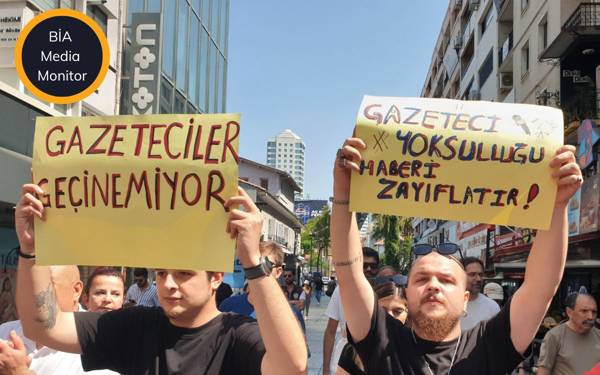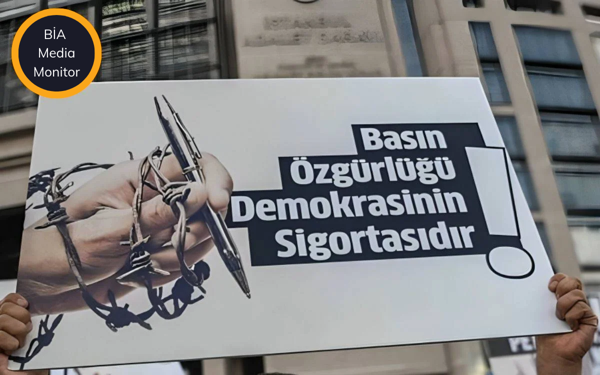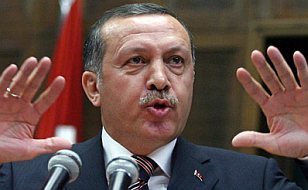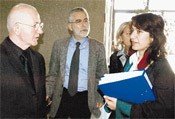Oran And Kaboglu Trial To Continue
The two academics as well as approximately 20 lawyers defending them, including Oya Aydın, Bahri Bayram Belen, Haluk Inanıcı, Sezgin Tanrıkulu, Kazım Genc and Asude Senol, attended Monday's hearing at the 28th Ankara Penal Court of First Instance where they are charged under Articles 216/I and 301/II of Penal Code, facing 18 months to five years imprisonment.
In reply to the Court's request, the Ministry of Justice reported there was no need for permission to be granted to investigate charges of "public humiliation of the courts authority." Taking also into account the date of crime, judge Avni Mis recalled that the trial on article 301 had been stopped in the lack of permission for investigation and a letter had been sent to the Ministry of Justice.
Trial continues on article 216
Continuing the trial under article 216 that regulates the offence of "dangerous incitement of public hatred and enmity," the court heard 6-7 witnesses who were involved in the voting for the report that constitutes the alleged crime.
Prof. Dr. Oran reacts to witness call
Prof. Dr. Oran reacted to the court calling witnesses asking the judge, "even if all of of the witnesses testify against us, under which article of the penal code will you sentence us?"
"Even if it was to result with acquittal, after what has happened to people who have been asked to prepare an official report, from which expert are you going to ask for reports? Which expert will write a report for you after all of this?" Oran questioned.
Prof. Dr. Kaboglu, the other academic also on trial, submitted a nine page additional defence statement to the court in addition to his previous defence. He stated that the judicial institution of the state had put on trial another institution (BIHDK) which was set up by law and targeted developing and protecting human rights.
Kaboglu: Take 301 to the Constitutional Court
Prof. Dr. Kaboglu said that with this case Turkey and the concept of "Turkishness" referred to in the report was being tried and added, "at the stage this affair has reached with the trial, it is an intervention into the freedom of expressing opinions and an indicator that Turkey's problems are being covered by a shawl."
Arguing that article 301 was in violation of the constitution, he requested the court to take the issue to the Constitional court.
Prof. Dr. Kaboglu stated that the proceedings had led to indignation not only in Turkey but in various countries of the world and said "this trial should end today and here" but the court adjourned until 10 May for other witnesses to be heard.
"Sevres Paranoia" disturbs prosecutor
Approximately 25 witnesses were heard on 15 February when the case started. Ankara Republic Prosecutor Nadi Turkaslan who prepared the indictment on 14 November had referred to the concept of "Sevres Paranoia" in the report, alleging, "the demands of minorities in this report have great similarities to the provisions related to minorities in the Sevres Treaty that landed our country under occupation. With such a similarity, there is nothing strange in having a Sevres paranoia".
Prosecutor Turkaslan had also criticised the report for proposing a "Turkishness" concept instead of being a "Turk".
What is Sevres Treaty?
The Treaty of Sèvres of August 10, 1920, between the Entente and Allied Powers1 and the Ottoman Empire after World War I which denied a sovereign Turkish satate and envisaged the loss of a great deal of Ottoman territory outside of the Anatolian mainland as well as passing portions of southern Anatolia to Italy, while declaring Thrace and Western Anatolia, including the key port of Smyrna (now Izmir), would become part of Greece. The Bosphorus, Dardanelles and Sea of Marmara were to be demilitarized and internationalized, and the Ottoman army was to be restricted to strength of 50,000 men.
The nationalist government in Ankara rejected the terms of the treaty and resisted the Greek army's advance into the area assigned to Greece in Western Anatolia, and its further unilateral advance towards Ankara. Following the Greco-Turkish War (1919-1922) and the disastrous defeat of the Greek forces, a peace agreement was signed with the Soviet Union. These events forced the former wartime Allies to return to the negotiating table, and the terms of Sèvres were revised in Turkey's favor by the Treaty of Lausanne in 1923. (EÖ/II/YE)
BİA MEDIA MONITORING REPORT 2024
The government made journalists' lives a living hell in 2024

BİA MEDIA MONITORING/OCTOBER-NOVEMBER-DECEMBER 2024
Truth concealed through repression from all sides targeting journalists

BİA MEDIA MONITORING REPORT
Just silence the journalist, and I won't touch you!

BİA MEDIA MONITORING APRIL-MAY-JUNE 2024
Journalists are on the target and have no legal security anymore!

BİA MEDIA MONITORING REPORT
The era of 'judicial control' confinement and torture in journalism








